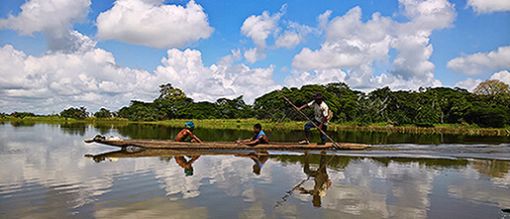BRISBANE | Emmanuel Peni from Project Sepik has travelled from East Sepik province in Papua New Guinea to raise awareness about the proposed Frieda River gold-copper mine and to meet with miner PanAust, a Chinese owned-Australian-licensed company with its head office in Brisbane.
Joined by Project Sepik partners, Jubilee Australia and Aid/Watch, Mr Peni personally delivered a message on behalf of the Sepik River people in a meeting with PanAust General Manager, Scott Cowie, Superintendent of Social Sustainability and Stakeholder Engagement, Nelson Sukiwainomb, and Daniel Moriaty, the Principal Environmental and Social Consultant, Leader Victorian ESIA team, for consultancy firm Coffey.
Mr Peni stated, “I am L’rigimban Nambi, I am the jambia - the “no entry sign” of my clan. As customary landowners we don’t want the mine. Sepik is my soul, my peoples’ soul. Our message is very clear, and it has been stated so many times and in so many ways - PanAust please pack your stuff and go!”
The Sepik River is one of the largest uncontaminated freshwater wetland systems in the region. Project Sepik, through their awareness, tour have collected thousands of signatures across 23 villages expressing opposition to the Frieda River Mine going ahead.[2]
“The Sepik River is not just a river it is a living thing. It is a river in which my ancestors are alive in many life forms, it is a river that gives me live and a river that is a home of the unborn children of Sepik. The River is an identity, it defines us and we it. It is a spirit that is present in us and we are part of it in spirit. We are intricately connected to the river.”
When questioned by Mr. Cowie at the PanAust meeting about the need for infrastructure, health and education and the opportunities the proposed mine could bring, Mr Peni reminded him of the many environmental and human rights disasters caused by mining in Papua New Guinea stating, “We do not need an outsider to come, to dig up the land, to destroy the trees and rivers and then say they will give us development. We will develop ourselves.”
“A recent EU grant of 430 million kina [AUD184 million] means roads will be built and people will be able to sell their vanilla, cocoa, fish, crocodile skin and eggs, and local tobacco. These, along with local tourism, have proven to be economical and has the potential to sustain our lives,” Mr Peni said.
The PanAust website states that the company is committed to the International Council on Mining and Minerals (ICMM) position to engaging with Indigenous Peoples and Free, Prior and Informed Consent (FPIC) which includes obtaining ‘the consent of indigenous peoples where required’.[3]
Natalie Lowrey of Aid/Watch said, “Indigenous peoples and customary landowners have long asserted a right to determine whether resource development can occur within their traditional territories. FPIC is in place to mitigate risks associated with both the social and legal license to operate, this means much more than just consultation and engagement - consultation is not consent.”
“Thousands of people who have lived and survived on the Sepik river system for 50,000+ years have clearly said no to the Frieda mine, this includes no to the mine even engaging with them. This begs the question as to whether PanAust is taking FPIC seriously and whether they can ever have a social licence to operate.”
Dr Luke Fletcher of Jubilee Australia said, “We were pleased with this constructive meeting with Pan Aust today. The message we took from the meeting is that Pan Aust will not force through this development without full consultation AND consent of the affected people, both in the Frieda mine site and the Sepik river communities downstream. We expect this to be honoured, especially when it comes to the upcoming Development Forums.”
